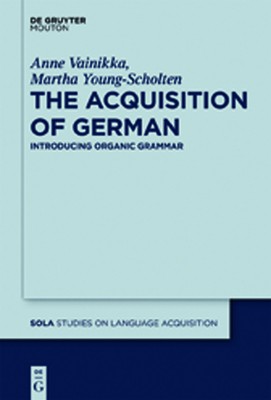
- We will send in 10–14 business days.
- Author: Anne Vainikka
- Publisher: Walter de Gruyter
- Year: 2011
- Pages: 419
- ISBN-10: 3110263769
- ISBN-13: 9783110263763
- Format: 15.6 x 23.4 x 2.4 cm, hardcover
- Language: English
- SAVE -10% with code: EXTRA
Reviews
Description
The Acquisition of German: Introducing Organic Grammar brings together work on the acquisition of German from over four decades of child L1 and immigrant L2 learner studies. The book's major feature is new longitudinal data from three secondary school students who began an exchange year in Germany with no German knowledge and attained fluency. Their naturalistic acquisition process -- with a succession of stages described for the first time in L2 acquisition -- is highly similar to that of younger learners. This has important implications for German teaching and for the theory of Universal Grammar and acquisition. Organic Grammar, a variant of generative syntax, is offered as a practical alternative to Chomsky's Minimalism. The analysis focuses on extensive monthly samples of the three students' German development in an input-rich environment. Similar to previous studies, the teenagers build syntactic structure from the bottom up. Two acquired correct word order by the end of the year, the third, who had greater conscious awareness of German grammar, had a divergent route of development, suggesting that language awareness can alter a natural developmental path. The results are addressed in light of recent debates in child-adult differences.
EXTRA 10 % discount with code: EXTRA
The promotion ends in 9d.13:18:04
The discount code is valid when purchasing from 10 €. Discounts do not stack.
- Author: Anne Vainikka
- Publisher: Walter de Gruyter
- Year: 2011
- Pages: 419
- ISBN-10: 3110263769
- ISBN-13: 9783110263763
- Format: 15.6 x 23.4 x 2.4 cm, hardcover
- Language: English English
The Acquisition of German: Introducing Organic Grammar brings together work on the acquisition of German from over four decades of child L1 and immigrant L2 learner studies. The book's major feature is new longitudinal data from three secondary school students who began an exchange year in Germany with no German knowledge and attained fluency. Their naturalistic acquisition process -- with a succession of stages described for the first time in L2 acquisition -- is highly similar to that of younger learners. This has important implications for German teaching and for the theory of Universal Grammar and acquisition. Organic Grammar, a variant of generative syntax, is offered as a practical alternative to Chomsky's Minimalism. The analysis focuses on extensive monthly samples of the three students' German development in an input-rich environment. Similar to previous studies, the teenagers build syntactic structure from the bottom up. Two acquired correct word order by the end of the year, the third, who had greater conscious awareness of German grammar, had a divergent route of development, suggesting that language awareness can alter a natural developmental path. The results are addressed in light of recent debates in child-adult differences.


Reviews